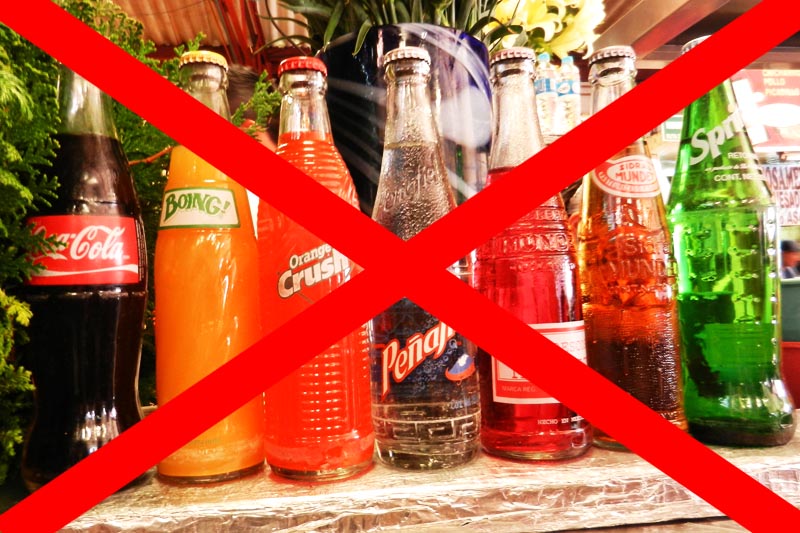
(Image: Travis)
Do you drink soda? How often do you drink it?
When I was young, I was an avid drinker of Coca-Cola and other soft drinks. Actually, I was pretty much a Coke addict (funny that the term refers to both the soft drink and cocaine). I could never get past a day without Coke — it was normal for me to finish nearly 1.5 liters in a day.
As I grew up, I became more conscious of the need to be healthy. I looked into my diet, including my soda habits, and realized how unhealthy soda was. So I removed them from my diet. Coke, Sprite, Pepsi, all of that. On the very rare occasions when I drink soda, I find the taste exceedingly sweet, acidic, and unpalatable — I can’t get past a few sips. Looking back, it was hard to believe that I was putting so much of this junk into my body.
Here are 5 reasons why you should quit drinking Coca-Cola and soda.
1) High Sugar Content
Soda has very high sugar content. A 12 oz (355 ml) can of Coke has 140 calories in total, all of which are from sugar. In case this means nothing to you, here’s a visual representation:
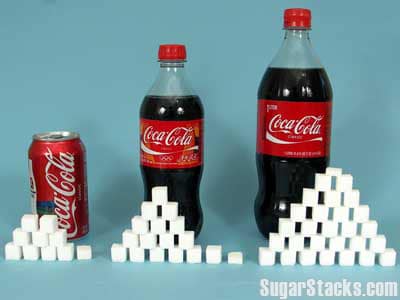
Every can of 12 oz (355 ml) Coke has 9.5 cubes of sugar in it. Most people find it excessive to have more than two sugar cubes per cup of coffee. (Image: Sugar Stacks)

If that isn’t bad enough, Mountain Dew is even worse — on a per-oz basis, it has 40% more caffeine and 15% more sugar than Coke (Image: Sugar Stacks)
According to the American Heart Association, the maximum amount of added sugars you should eat in a day are no more than 100 calories per day for women (or 6 teaspoons), and no more than 150 calories per day for men (or 9 teaspoons).[1] Added sugars refer to sugar that is added to food during preparation or processing. One can of Coke alone exceeds this quota for women and is almost the entire quota for men.
When we drink sodas, it causes our blood sugar to rise rapidly, which is then immediately converted into fat if the energy is not used. Unlike in fruits, sugar in sodas is all refined sugar without fiber to slow down the absorption. Taking in a large amount of sugar this way (such as via a can of soda a day), over time, then creates the risk of many health problems, such as obesity, increased blood pressure, heart disease, smaller brain volume and lower memory, type 2 diabetes, damage to blood vessels, and cancer.
2) Increased risk of diseases
Even though Coke and Pepsi’s advertising looks very enticing, with celebrities like Britney Spears and Kendall Jenner drinking sodas happily and looking like it’s the cool thing to do (while being paid to do that), the drinks themselves aren’t sexy at all.
First off, these conglomerates spend billions each year to build consumer interest. This involves large teams of advertising executives whose sole, full-time job is to come up with campaigns and ways to draw your interest in their sodas, in an organic way that makes you feel like you are the one who wants to drink it — when this interest has been planted long ago, from when you saw their large billboards, product placements in TV shows, and TV commercials.
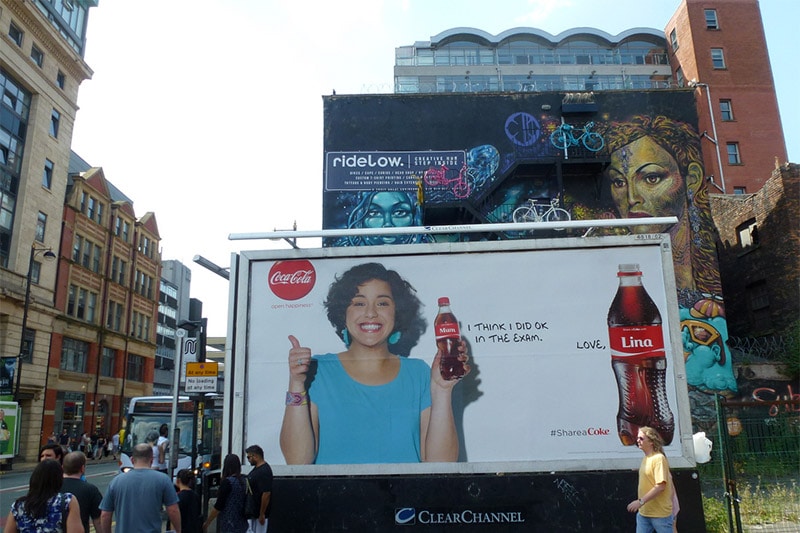
(Image: Gene Hunt)
This marketing diverts our attention away from the fact that these sodas are, at the end of the day, sugared water with a lot of chemicals, some known to increase gastric secretions, increase asthma attacks, eat away our stomach linings, and aggravate the heart system.[2][3][4] Sodas have been linked with increased risk for many diseases:
- People who consume sugary drinks regularly — 1 to 2 cans a day or more — have a 26% greater risk of developing type 2 diabetes than people who rarely have such drinks.[5]
- A study that followed 40,000 men for two decades found that those who averaged one can of a sugary beverage per day had a 20% higher risk of having a heart attack or dying from a heart attack than men who rarely consumed sugary drinks.[6] A related study in women found a similar sugary beverage–heart disease link.[7]
- A 22-year-long study of 80,000 women found that those who consumed a can of sugary drink a day had a 75% higher risk of gout than women who rarely had such drinks.[8] Researchers found a similarly-elevated risk in men.[9]
(Source: Harvard School of Public Health)
If you think diet soda is different because it has no sugar, think again:
- Researchers found that drinking diet soda daily can triple the risk of stroke and dementia than those who don’t.
- In a 2013 study on rats, the rats that drank diet soda had shrunken and degenerated neurons (even more so than the rats that drank normal soda). Rats are often used in research because their genetic characteristics closely resemble those of humans.[10]
- Daily consumption of diet soda was associated with a 36% greater relative risk of metabolic syndrome (a cluster of risk factors for heart disease, stroke, and diabetes) and a 67% greater relative risk of incident type 2 diabetes compared with non-consumption. The study was done over 8 years.[11]
- A study of 59,334 pregnant women found a link between the intake of artificially-sweetened soft drinks and an increased risk of preterm delivery. This link was not found for sugar-sweetened soft drinks.[12]
And there are new studies that emerge by the year showing more harmful effects of soda. It is not an accident that obesity and health diseases have been on the rise in America, around the same time when soda and junk food consumption started rising dramatically.[13][14]
3) Corrodes your teeth
Not only do colored sodas stain your teeth, but sodas destroy 10X more teeth material than fruit juices in just the first 3 minutes of drinking. Slices of enamel were placed in Coke and other carbonated drinks for 48 hours, where there was a 5% weight loss of the enamel in the end. The high acidity content (pH 2.0-4.0) causes corrosion of your enamel.
If the above doesn’t mean anything to you, watch this video showing what happened to a tooth enamel after it was soaked in Coke for 5 days:
And here’s another video of how Coke completely dissolved the shell of a hard-boiled egg after 1 year (egg shells are made up of similar components as our teeth):
4) Causes insomnia and sleeping disorders (In high quantities)

(Image: Joi)
Coke and soft drinks contain caffeine, a psychoactive drug. It affects our central nervous system and alters brain function, resulting in temporary changes in perception, mood, and behavior.
There is a lot of conflicting information on caffeine, but it is agreed that caffeine at certain levels negatively affects sleep. Caffeine prevents drowsiness by (i) blocking the effects of hormones serotonin and melatonin and (ii) blocking adenosine receptors (sleep-inducers) from being bound. Even when you fall asleep, it prevents you from getting the full benefits of sleep:
The most important long-term problem (of caffeine) is the effect (it) has on sleep. Adenosine reception (sleep inducers) is important to sleep, and especially to deep sleep. The half-life of caffeine in your body is about six hours. That means that if you consume a big cup of coffee with 200 mg of caffeine in it at 3:00 p.m., by 9:00 p.m. about 100 mg of that caffeine is still in your system. You may be able to fall asleep, but your body will probably miss out on the benefits of deep sleep. (Source: How Stuff Works)
I remember long ago when I drank (Diet) Coke, it kept me up all night until 6 am, even though I tried turning in at 2 am. My mind went into overdrive and I could not sleep even though my body was physically tired. If you drink Coke/soda and you find it hard to manage your sleeping schedule, it may be the caffeine causing the problem.
While you may want to drink lots of caffeine to stay awake, bear in mind that the boost is temporary. You’re running on “borrowed” energy; you may feel good now, but you feel lethargic and uneasy after a few hours. Those who rely on caffeinated soda/coffee to stay awake every day become addicted to it, and rely on it to get by rather than tapping into their body’s natural rhythm.
To quote Jacob Teitelbaum, “Caffeine is an energy loan shark. What it lends you in the morning it takes back with heavy interest in the afternoon.”
5) Causes Weight Gain
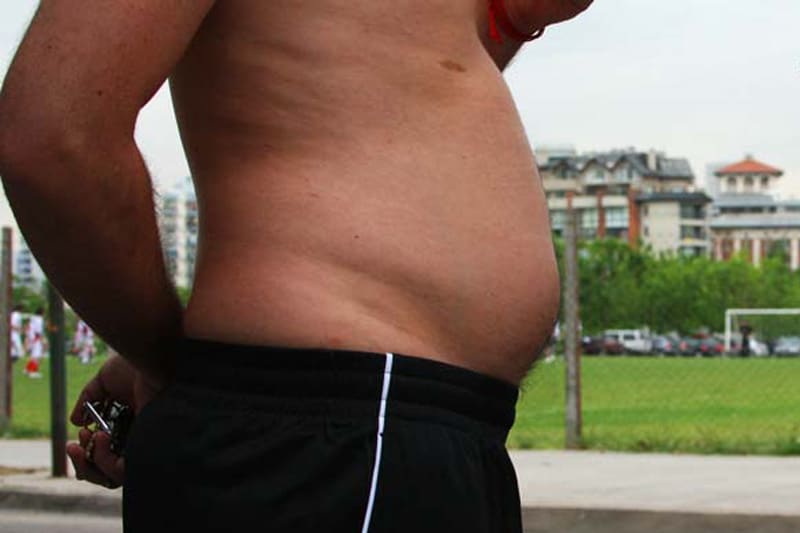
(Image: Diego K)
One 330ml can of Coke contains around 140 calories. At a can every day, that’s 4,200 extra calories every month or 1.2lbs. That’s 50,400 extra calories or 14.4lbs in a year. Granted you will not gain an absolute 14.4lbs since our body metabolism adapts accordingly by burning more/fewer calories, but you clearly gain weight when you drink Coke/soda over healthier, lower-calorie options.
Contrary to popular belief, Diet Coke/soda is counteractive to weight loss efforts too. Research by the University of Texas Health Science Center showed that subjects who drank two or more diet sodas a day had waist size increases 6X greater than those who didn’t drink diet soda.
While there are many theories explaining this counter-intuitive finding, I tried this out for myself. I tried the following scenarios at two different times: one drinking Diet Coke and another drinking just water.
The result? I had a much higher tendency to go into binge attacks when I drank Diet Coke. My thought is that artificial sugar in diet sodas confuses your body when it tastes something sweet that isn’t sugar. As a result, your body craves actual, sweet food. So while you may be taking in 0 calories from drinking diet soda, there is a higher likelihood that you will consume more food after drinking it, leading to weight gain.
How to Quit Drinking Coke / Soda
So how can you quit Coke and soft drinks?
- Identify why you want to quit. To succeed in the goal, you need a strong enough reason. You don’t need a big list of reasons, just one that’s enough to move you. It can be to lose weight, to be healthy, etc. Use this reason to drive you to quit the habit. Whenever you feel like giving up, recall it. For me, it was because I want to be healthy. My health is too important to me and I didn’t see the point of harming my health with an action that’s entirely preventable. If sodas are so harmful and they have proven to be, then I’d much rather make the switch now and enjoy the rest of my life in a healthier, better body.
- Get rid of the sodas in your house. If you want to quit, quit now. There’s no need to wait. If you have sodas in your fridge (and no one else consumes them at home), throw them away or give them to people who drink them (though I’d recommend that you tell them to quit and pass them this article). It may seem like a waste but it’s better than downing them into your body and ruining it.
- Have healthy substitute drinks. After quitting soda, I now drink either plain water, brewed green tea, or freshly squeezed fruit juices. If you’re in a restaurant, get plain/mineral water — there’s no need to get a flavored drink just because you’re eating out. I recommend not to substitute soda with coffee — its higher caffeine levels make it an unhealthy drink too (in fact, it has 2-6X caffeine than Coke on a per oz basis). Brewed green tea is a great substitute — it is known as one of the world’s healthiest drinks with a high level of anti-oxidants (highest in any tea) and anti-carcinogenic effects, and it has very low caffeine levels relative to Coke and coffee.[15][15]
- Keep track of your soda consumption. How much soda do you drink every day? Did you drink soda today? Yesterday? The day before? Make a record of the times when you drink soda. Then cut back by 50% every week, until it’s finally down to 0%. If you can go straight to 0%, all the better, but if you can’t, then create a transition plan.
- Bring a water bottle with you at all times. Fill it with plain water — it’s free, there are no calories, and it’s healthy. Not only will you not get thirsty, but it’s also economical.
- Have enough sleep. So you don’t have to resort to caffeinated sodas to keep you awake later in the day.
- Persevere. As you start cutting away Coke and sodas from your life, you may find withdrawal symptoms in the first week (depending on how heavy a drinker you were before). These symptoms may come in the form of restlessness, anxiety, and a craving to drink again. Push through! They will start melting away after a few days.
After you quit, you’ll realize how unhealthy sodas are. In the rare times when you do get a sip, you’ll immediately notice how sweet it is — and wonder why you were even drinking it before. Good luck and stay healthy — I want you to live as long and as healthy as you can.
If your friends or family drink soda, pass this article on to them. Let’s all stay healthy and strong and keep improving our health. :)
This is part of the Cultivate Good Habits Series. Check out the full series:
- 21 Days To Cultivate Life Transforming Habits
- Waking Early: 9 Reasons To Wake Up Early | 21 Tips To Wake Up Early
- Quitting Soda: 5 Reasons To Quit Drinking Soda (And How To Do It)
- Improve Your Posture: Benefits of a Good Posture (And 13 Tips to Get One)
- Be TV-Free: 10 Reasons You Should Stop Watching TV
- Being On Time: How To Be On Time
- Meditation: 10 Reasons You Should Meditate | How To Meditate in 5 Simple Steps
- Manage Emails Effectively: How To Manage Your Emails Effectively
- Run Barefoot: 10 Reasons To Run Barefoot
- Emotional Eating: How To Stop Emotional Eating (6-part series)





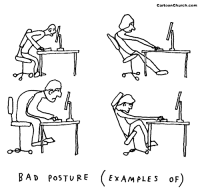
 Thanks for reading. If you like my free articles, join my private email list and get my latest updates and articles sent right to your inbox.
Thanks for reading. If you like my free articles, join my private email list and get my latest updates and articles sent right to your inbox.